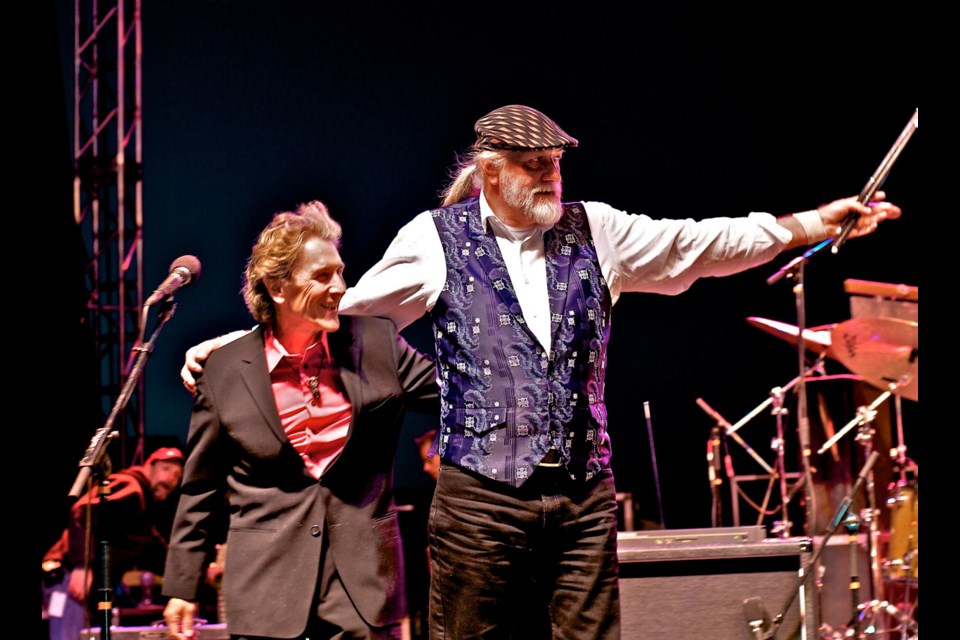PREVIEW
What: Mick Fleetwood Blues Band featuring Rick Vito with opening act Dino DiNicolo
When: Sunday, 7:30 p.m. (doors at 6:30)
Where: Farquhar Auditorium, University of Victoria
Tickets: $77.50-$97.50 at tickets.uvic.ca, the UVic Ticket Centre, or by phone at 250-721-8480
The longer musicians work at their craft, the more skilled they become at playing the blues.
“At some point, the returns may be a little suspect, but you’ll always find a way of doing it,” said drummer Mick Fleetwood. “Even if you can’t accomplish what you did because of some physical thing, you find methods to get around it — which is a form of getting better at what you do.”
Though he’s known for popularizing folk-rock in Fleetwood Mac, the band’s namesake (who turned 69 over the summer) knows as much about the blues as anyone.
He first started playing the blues in the mid-’60s, with singer Rod Stewart in a band called Shotgun Express.
Fleetwood went on to join John Mayall and the Bluesbreakers, before leaving that institution to form an early version of Fleetwood Mac with fellow Bluesbreakers Peter Green and John McVie.
During its early days, Fleetwood Mac was known as one of the premier blues bands in Britain, rivalling for a time the output of the Rolling Stones and Cream. The band split from Green, considered one of the greatest guitar players in history, in 1970, but the foundation from that era has set Fleetwood upon a path that continues today under the guise of the Mick Fleetwood Blues Band.
The quartet is technically considered a side-project — Fleetwood Mac continues to tour, and is reportedly working on material for a new studio album — but the blues will always be a prominent part of his life, Fleetwood said.
“It has been a real shot in the arm, this group. We’re working. I love playing, and there is nothing getting in the way. We’re not trying to prove anything, so it’s all about those two hours on stage.”
Fleetwood said the Grammy Award-nominated group, which has been an on-and-off entity for the past dozen years, is like “a real fraternity.” He is joined in the group by singer-guitarist Rick Vito, bassist Lenny Castellanos and keyboardist Mark Johnstone — none of whom are getting any younger, he quipped.
But with old age comes experience, he added.
“I’m not dead yet. There’s a huge, massive amount of baby boomers who are still vibrant, and they are all finding ways to express, to be emotionally connected. That generation is not going to go easily.”
Vito, an impressive slide-guitar player who in 1987 joined Fleetwood Mac following the departure of Lindsey Buckingham, gives Fleetwood a strong counterpoint in the group. Their long friendship has produced an unspoken musical connection, through which a series of Fleetwood Mac blues classics are channelled in concert. The band’s Victoria debut, which goes Sunday at the University of Victoria’s Farquhar Auditorium, is set up to be something special, Fleetwood promised.
Albatross, Oh Well and Black Magic Woman, three of the biggest hits from the early Fleetwood Mac era, will be performed with zip.
“Someone who is lucky enough, in my opinion, to know how it feels to be passionate … if you have that, you won’t settle for anything less,” Fleetwood said.
Fleetwood has great memories of his career, many of which are centred on his vast collection of photographs.
Fleetwood always had a camera back in the old days, and caught through his lens private moments with members of the Beatles and Rolling Stones, among countless others. It is great to have the images as a reference point today, he said, even though his camerawork made him “the party bore” at the time.
He has shown many of his photographs at exhibitions over the years, including a recent one at a museum near his home in Maui. He is also putting together a pictorial book with Genesis Publications, the company behind similar books of photographs from the Beatles, the Rolling Stones, Bob Dylan, Pink Floyd and David Bowie, among others. Fleetwood said his first compendium with the publisher will tell the story of the early days of Fleetwood Mac, before Buckingham and Stevie Nicks arrived.
Another volume of photos during the band’s peak years, which saw them become one of the most commercially successful groups in the history of pop music, is expected to follow.
“I’m not a brilliant photographer, but I loved doing it,” he said. “Really, where it started was the influence of my father, who always carried a camera. I did that with Fleetwood Mac, as did John McVie, to some extent. The corny adage, ‘Every picture tells a story’ is so true, and it certainly helped. A form of mythology can be triggered by an image, by a memory, by a sound.”
Fleetwood has plenty of thoughts on the role musicians of his ilk play in the grand scheme of things. He’s a big believer in paying forward to younger generations some of the knowledge he has acquired during his long career in music.
All they have to do is ask.
“Where your power resides is: ‘What worth are you?’ Sadly, in our society, people forget. But there’s huge worth in Europe, where elders are respected. And they are respected because they have something to say. They are a very good sounding board. He can’t run around the field with you, but you can talk to your grandfather about anything.”
